Celebrating the Life of Joseph Schmidt
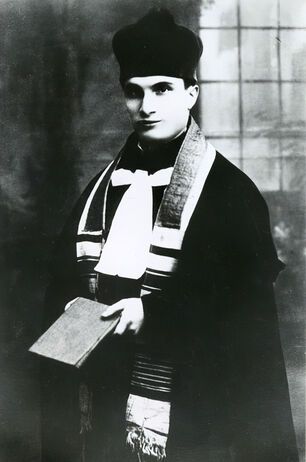
Today, at the special request of Monica in Tanzania we are going to celebrate the life and talent of Joseph Schmidt, the remarkable Jewish cantor and celebrated tenor, who was able to escape Nazi Germany because of his great reputation but returned to Germany to save his mother and sadly died as a result of his action of love and devotion.

We can learn a little about Joseph Schmidt through an article written by
Cantor Elihu Feldman titled: Two Hero Cantors of the Shoah Joseph Schmidt and Gershon Sirota. Feldman writes:
I am writing this article in observance of Yom Hashoah, Holocaust Memorial Day. In dedicating this article to the two hero cantors of the Shoah, Joseph Schmidt and Gershon Sirota, their memory is kept alive and the tragedy of their loss remains with us. Both cantors had the opportunity because of their great reputation to leave Nazi Germany, and did. Both however, though, returned to Germany and chose imminent death over life. Joseph Schmidt choseto try to save his mother rather than be free and Cantor Gershon Sirota chose to be with his Warsaw congregation on the seventh day of Passover for Yizkor, precisely when the Warsaw Ghetto was put to the torch. In this article we will meet Cantor Joseph Schmidt who died at the young age of 38 by the Nazis, after returning to Nazi Germany to care for his mother.3
Many Jewish musicologists say that to hear Joseph Schmidt's singing any of the 80-plus recorded songs and arias that he left behind to posterity, is to encounter one of the most glorious and tragic stories in the annals of music. In addition to being a cantor, to the Jewish and non-Jewish world he was respected as one of the most celebrated tenors of the 1920s and 1930s. He was affectionately called "the Jewish Caruso," and captivated audiences in Germany and throughout Europe with his singing for a decade. However, because of his Jewish ethnicity and his dwarf (sic) height he was denied the right to perform on the operatic stage in Nazi Germany. (In America, he was affectionately called '' the Pocket Caruso '' because of his small size...3
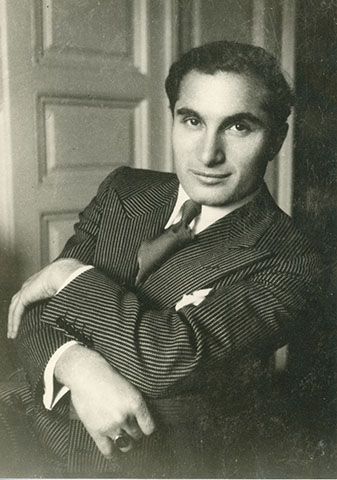
Joseph Schmidt was the eldest of the three children born to Wolf and Sarah Schmidt. The family lived in a multi-ethnic community composed of Poles, Romanians, Ukrainians, Germans, and Gypsies. In his youth Joseph studied languages, while living in Cernowitz. He became fluent in Romanian, German, French, and Hebrew. In Cernowitz he served as a very young cantor in the local synagogue. It was there that his voice began to show serious promise, as he sang operatic arias in addition to Chazzanut and Jewish folk songs.3
He studied voice in Berlin, but his life was interrupted by three years of military service in the late 1920s. Upon his discharge, Schmidt resumed his career as a cantor in the synagogue in Cernowitz. His work there led to a performance in Berlin, which, in turn, led to an engagement to sing the role of Vasco de Gama in the opera L'Africaine by Meyerbeer in a broadcast performance on radio. That broadcast led to an international career for Schmidt as record companies scrambled to sign this man, whom the opera-loving public desperately wanted to hear more of. He was signed on briefly to the largest recording companies in Germany: Telefunken's predecessor, Ultraphone, and HMV, but for most of his career, Schmidt recorded for the Odeon and Parlophone labels.3
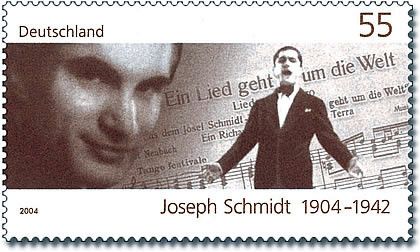
Elihu Feldman goes on in his article to explain that:
By 1931, amid an ever-growing list of singing engagements, Schmidt began his movie career with a movie called Der Liebesexpress, in which he had a supporting part as a singing bartender. He made a handful of additional films in which he played starring roles, and which were released in English-language versions; all of them successful.3
Schmidt had major audiences in England and America, as well as the Netherlands, France, Belgium, and much of the rest of Europe and South America, but his greatest renown was in Germany. The sad irony was that he was massively popular in the country whose political system put him in the greatest jeopardy conceivable. Schmidt tried to ride out the ban on Jewish performers imposed after the election of the Hitler regime, and with help from people like Richard Tauber, a colleague and friend, he did get to perform on occasion.3
In 1937, he left Germany for an extended tour of the United States, where he performed in concert with such legends as Metropolitan Opera star Maria Jeritza, movie/concert legend Grace Moore, and Erna Sack. By this time, he was forbidden to appear in Germany and Austria, but was warmly welcomed in Belgium and the Netherlands.3
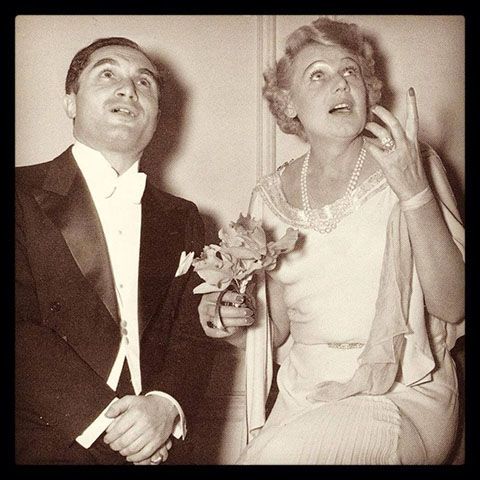
In 1939 he returned to Cernowitz for a final visit with his recently widowed mother. It was his hope to bring his mother out of pre-war Europe.3
As war erupted he tried to make his way to America, but made it only as far as a Swiss refugee camp in Gyrenbad. In 1940 he suffered a heart attack and was taken to the camp infirmary. He was quickly released, his complaints interpreted as excuses to escape the hard work of the camp. Forced to return to ditch digging he soon succumbed to a second heart attack and died. He was thirty-eight years old. He was buried in a Jewish cemetery near Zurich.3
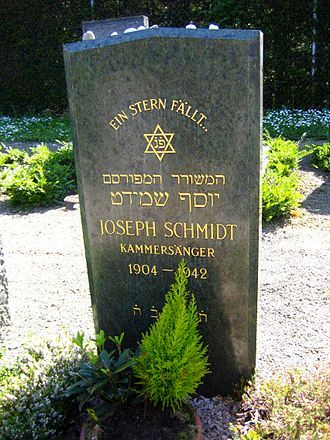
Cantor Elihu Feldman concludes with these words:
Joseph Schmidt was not only an important opera singer, he was also an outstanding cantor. However, Josef Schmidt did not compose his own cantorial pieces. Most of his pieces with the exception of the Lewandowski items are by David Moishe Steinberg - from Vilna - eg: "Habet," "Ana Avda" and "Kohanecha." Renowned for his phenomenal upper register, Schmidt is often heard effortlessly ascending to As, Cs, and the occasional high D. His warm lyric voice is perfect for the melodies of Schubert and Lehar; a rich velvety amber. Like so many before and after him, Joseph Schmidt was a victim of his time. Still greatly admired for his technique and vocal qualities, many recordings are currently available on CD. Truly, no cantorial or operatic collection is complete without at least one recording of the amazing Joseph Schmidt.3
It is said that Joseph Schmidt had one of the most powerful tenor voices ever recorded. To hear him, even as recorded in the 1930s, is to hear one of the most transcendent voices of the century. Had he lived a decade longer, he would have been a natural for the recording studio, singing all of the great lyric tenor roles of Italian, French, and German opera and operetta on late 78 rpm discs and early LP records. Had he lived a normal life-span, into his 60s, his voice would have challenged all rivals right up through the advent of Luciano Pavarotti's career in the 1960s. And had he been of sufficient physical stature, he would have owned all of those same roles as surely as Caruso did at the turn of the century and Pavarotti did in the 1960s and 1970s.3
And now thanks to Youtube you can hear Joseph Schmidt sing. First Joseph sings Monica in Tanzania's request: M'apparit tutt amore from Martha by von Flotow. Below are the words in German and English.
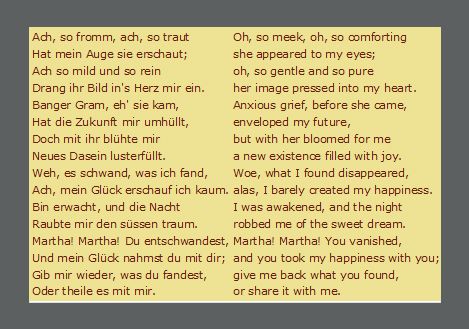
This recording of Joseph Schmidt singing M'apparit tutt amore (Ach so fromm) from Martha by von Flotow is from November 1929.
(Digital audio restoration 2021).
In the next recording Joseph Schmidt sings an Aramaic Prayer in cantorial style. Amazing runs and ornaments reveal a wonderful musician and true vocal gymnast. You need to listen beyond the poor quality of the recording (1934).
Joseph Schmidt's recorded legacy displays a voice of amazing range and flexibility, a flawless technique and impeccable artistry and taste. In this next recording, Schmidt sings Hans May's delightful song "Heut' ist der schönste Tag in meinem Leben". This performance, demonstrating the tenor's ease with high tessitura, was recorded in Vienna in the fall of 1935.8
And finally, a completely different role for Joseph - from the 1933 movie Ein Lied geht um die Welt.
Credit
1. holocaustmusic.ort.org
2. youtube.com
3. bhol.co.il
4. imdb.com
5. en.wikipedia.org
6. facebook.com
7. opera-cat.livejournal.com
8. youtube.com
